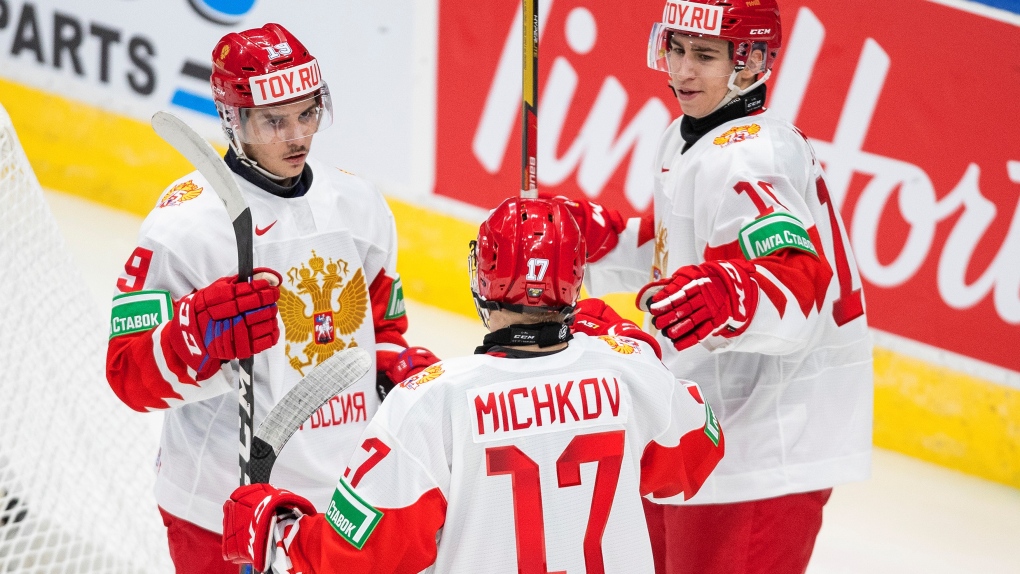Where to pick Matvei Michkov and other Russian players is a top question at the NHL draft
Matvei Michkov is the NHL draft’s man of mystery.
The gifted, playmaking winger is probably the best Russian hockey prospect in nearly a decade — and maybe longer, going back to Alex Ovechkin and Evgeni Malkin in 2005. His highlight reel is full of shifty stickwork, nifty moves and shots that leave goaltenders helpless to stop them.
Still, he’s no lock to be chosen in the top five.
The reasons range from the 18-year-old Michkov being under contract in the KHL for three more years to the war in Ukraine, which has led to Russia being banned from international tournaments, countries imposing travel restrictions and scouts getting fewer opportunities to see him in person. Some of the same questions apply to other Russian prospects including winger Danil But, defenseman Mikhail Gulyayev and goaltender Ruslan Khazheyev.
Veteran executive Doug Armstrong likened the situation to the Cold War, when it was harder to evaluate talent from the Soviet Union.
“This year’s dynamic is different,” said Armstrong, general manager of the St. Louis Blues, who have the 10th pick when the draft opens Wednesday. “It’s the live views and also the meetings. It’s also getting to talk to people around him. It’s been shut down. We’re relying very heavily on our scout from that area and contacts, but it’s definitely second-hand information.”
While the political climate has shifted again, the debate over drafting highly touted Russian hockey players is familiar. The Detroit Red Wings won the Stanley Cup twice and became a powerhouse in the 1990s with the “Russian Five,” and the Washington Capitals’ path to their first championship five years ago included taking Evgeny Kuznetsov 26th in the 2010 draft when other teams were reluctant.
Michkov is unlikely to experience a similar fall — it’s hard to see him getting past either Philadelphia at No. 7 or Washington at No. 8 — but there is a lack of familiarity with his game aside from video clips. There also is a lingering reticence about picking Russians, something Detroit GM Steve Yzerman chalks up to not having key decision-makers or scouting directors in Russia.
“I don’t think, throughout the league, there’s a real bias for any reason on the Russian players,” said Yzerman, who was captain of the Red Wings when they won in 1997 and ’98. “The only challenge has been, and the only concern is, the ability to really see the kids. … If they’re not seeing them as much, they’re going to be a little more hesitant to make that pick particularly high.”
As long as Michkov goes before No. 10, he will be the highest-drafted Russian player since Carolina took Andrei Svechnikov second in 2018.
IPlayers picked that hight are expected to make an impact in the next couple of seasons, but Michkov’s KHL status may not allow that. Armstrong said he expects Michkov to honor his contract, and interested teams are set to meet with the player’s camp this week.
Even if Michkov is only an option in 2026, he will still be just 21 — two years younger than Kirill Kaprizov was when he made his NHL debut for Minnesota. Kaprizov was worth the wait: Only six players have scored more goals since.
Plus, executives say, it’s a similar wait for most players coming out of college or the Canadian junior hockey ranks to become NHL-ready.
“We’ve always been very, very patient with our prospects,” said Ross Mahoney, assistant GM of the Capitals, who took Russian Ivan Miroshnichenko in the first round last year. “I think it’s the right way to go. There’s no sense to rush them into the NHL.”
Could Michkov make that jump now, like expected top pick Connor Bedard and likely No. 2 selection Adam Fantilli? Head of NHL Central Scouting Dan Marr said changing KHL teams this year affected Michkov’s ice time but he wasn’t worried about that.
“He’s definitely a first-round prospect,” Marr said. “When he gets to the NHL, he’s going to be an impact player.”
Whenever that is, for Michkov and others from Russia. Buffalo GM Kevyn Adams wants his staff to first evaluate players just for hockey, then have conversations about mitigating factors.
“There’s a risk-reward,” Adams said. “If you’re just blind to what’s going on in the world, I think you’re making mistakes. You have to be aware of everything and taking all that into consideration.”
If the reward is winning the Stanley Cup, any team would sign up immediately. The last eight champions have had at least one Russian player, evidence of the pipeline that has delivered since the late stages of the Cold War. That’s a big reason teams haven’t avoided making picks out of Russia recently.
“Guys are going to take the best player,” Yzerman said. “Players playing in Russia under contracts eventually, if they’re good, they’re probably going to want to come over. And if they’re good, you’re going to want to bring them over.”
——
AP Hockey Writers John Wawrow in Buffalo, New York, and Larry Lage in Detroit contributed.
For all the latest Sports News Click Here

